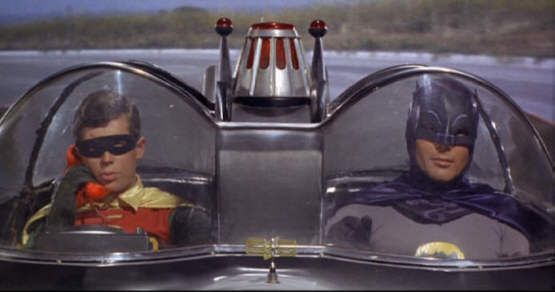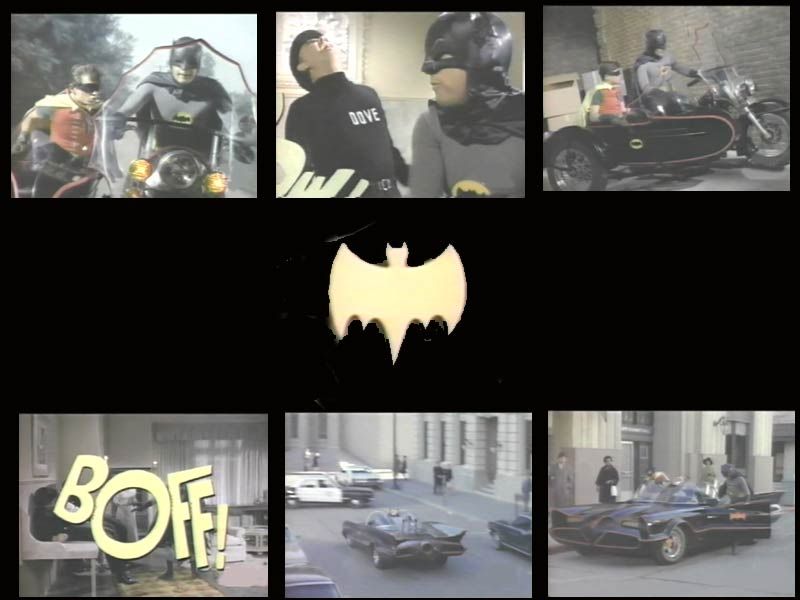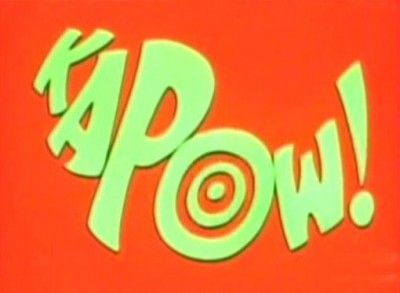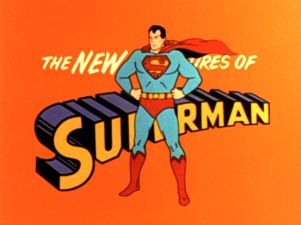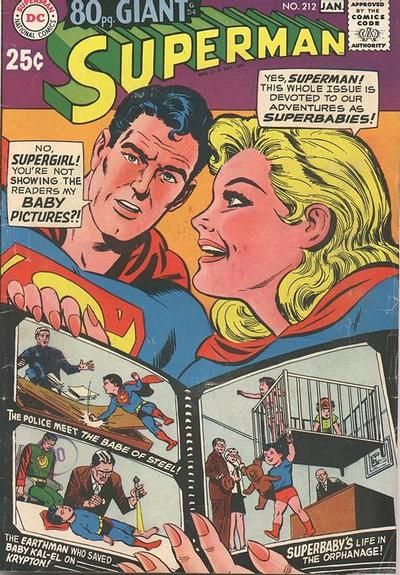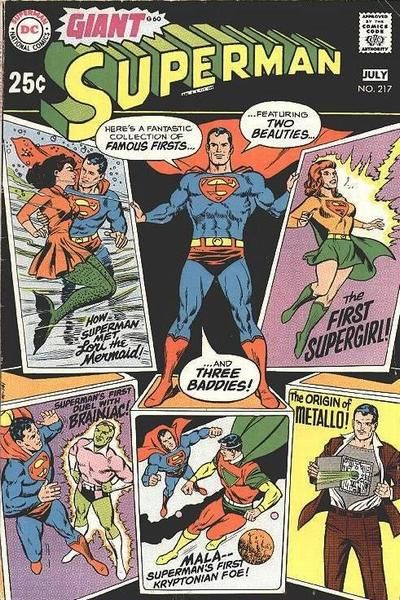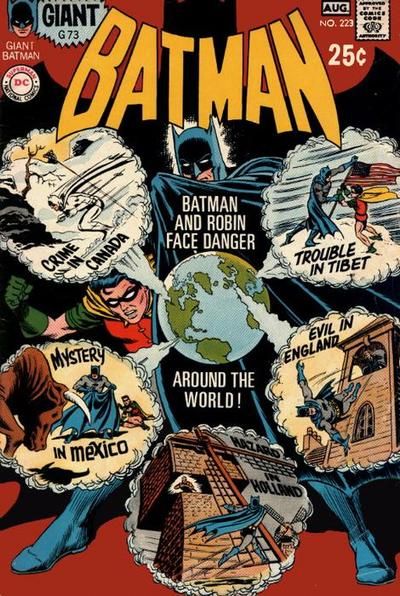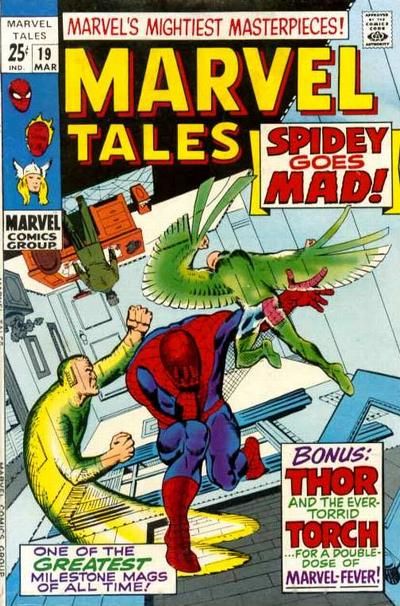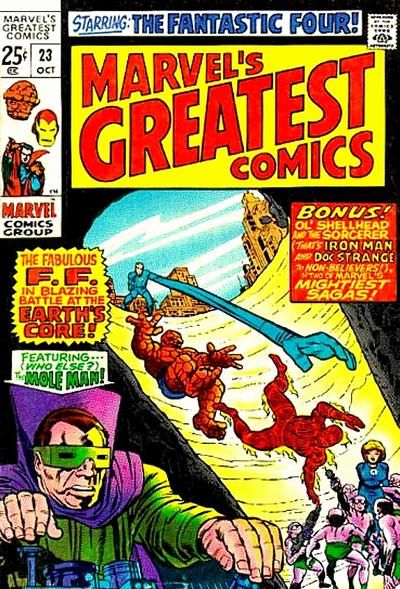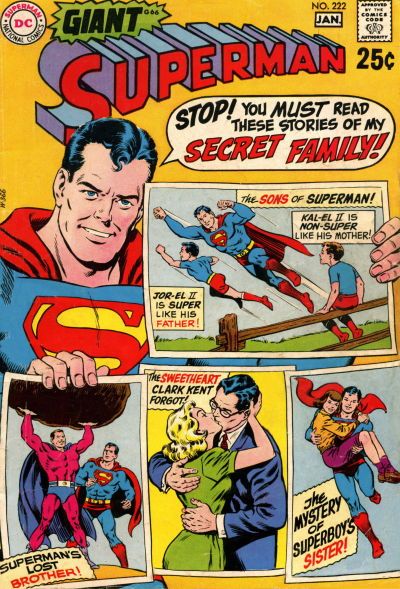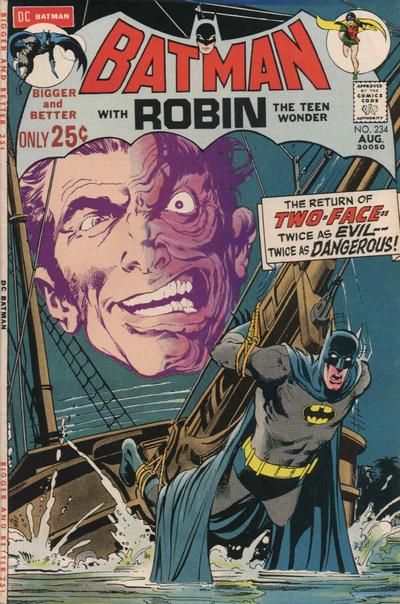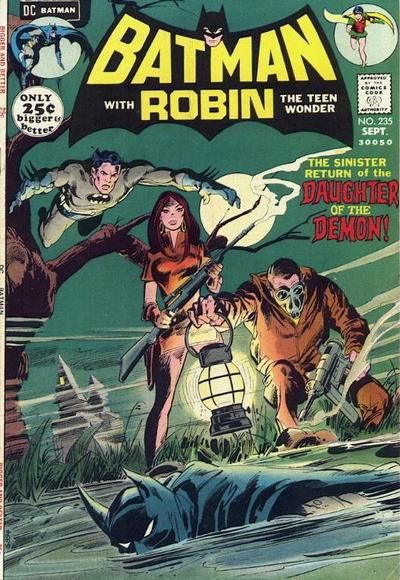As Brian kindly noted the other day, I did indeed have a birthday this last week. But it marked another sort of anniversary, as well.
I turned forty-six this week, which means that I've been... I'm not sure what the word is. Fascinated by? Obsessed with? Devoted to? Let's just say this week makes forty years that I've been embroiled with comics and superheroes, one way or another.
Realizing that, it got me thinking, how much has changed and how much has stayed the same. It occurred to me that it might be fun to reach back through the years at ten-year intervals over the next few columns and see if I couldn't create a sort of snapshot of my world and how it intersected with comics at different times throughout those forty years. I've written about different specific comics of these eras before, but I've never tried this kind of overview.
So, to start with, I thought I'd talk a little bit about the books that started the rock rolling down the hill. The stuff that launched four decades of my involvement with funnybooks, drawing, and writing that eventually led to me becoming an art teacher that specialized in the comics form, as well as the weekly gig writing these words to you.
*
Truthfully though, it didn't really start with comic books for me. It started with television.
I was a pretty unhappy kid in the late sixties. My family was a mess -- alcoholism, infidelity, crime, you name it, my folks were one-stop shopping for dysfunction. I will spare you the details -- this is supposed to be a fun column about comics, after all, not a therapy session -- but it does help to have a little context. Suffice it to say that it was a very solitary existence for six-year-old me. Almost from the moment I was old enough to be self-aware I was always looking for a way to get off by myself, away from the war zone. Generally that meant books or TV, because it was too hard to see other kids. In those prehistoric days before Jerry Springer, family problems were kept secret; you NEVER let on that there was any kind of trouble at home, which severely curtailed any kind of social involvement for us. Money was too tight for a lot of toys or movies or anything like that.
So television was where I got my first taste of escapist larger-than-life adventure. Voyage to the Bottom of the Sea, The Wild Wild West, all that stuff. I do remember that it was Mom's suggestion that I check out this new show. I sometimes wonder if she'd still have done it if she had known in advance what it would unleash in me.
The original Batman TV show has been accused of all sorts of things by comics fans over the years -- "It RUINED Batman! It's making FUN of comics! Nobody takes us SERIOUSLY because of that show!" -- and so on. Reportedly Julius Schwartz and the other DC staffers were horrified at that first episode. (With some justification, I admit. I can only imagine their faces at the sight of Jill St. John telling Batman that he "shakes a mean cape" as he's doing the Batusi. )
But for me and millions of other little kids across America, it was a revelation. It was loud and fast and simple and -- I'm serious -- WAY COOL. Batman and Robin had all this cool stuff, the computer and the Batmobile and even the secret door with the Batpoles. When you're six years old, the idea of opening a secret door and going down a slide and coming out as someone so much better -- a costumed crimefighter that has the job of going out and beating the crap out of bad guys... man. Think about that and how it sounds to a six-year-old kid who's never been given much reason to believe in the justice system. That's just intoxicating. If you are Batman and Robin, not only do the cops not hassle you, they are INVITING you to go kick the shit out of the Penguin. Who, let's face it, clearly has it coming, and if the police aren't going to do it, well, somebody better.
So sure, the Batman TV show was campy, it was silly, but who cared? Not me, I was six. All I could see was that damn, it was exciting and fun. More -- the thing that gave it such an impact on me, I think, in addition to the traditional superhero power fantasy, was the idea that Batman and Robin stood for justice. Or, to put it in a six-year-old's language, they made things fair.
I didn't understand a lot of what was going on around me back then, but I was absolutely certain that what was going on in my real life with my mom and dad was not how it was supposed to work in families, that something was terribly wrong, and that it was really, really unfair. God knows there were enough adults in my life who deserved a good solid Bat-style KA-POW!
The idea of a world where you could put on a mask and cape and go hit somebody who deserved to be hit, and presto, everything was FAIR again... I couldn't resist that.
So there were three times a week on television where I could flee into this other, better place where the bad guys got what was coming to them. The two nights Batman was on, and Saturday morning.
The superhero fad triggered by Batman and Space Ghost had resulted, for one glorious season in 1967 and 1968, in the most adrenaline-fueled Saturday-morning lineup ever presented by the networks.
Most cartoon shows were half an hour long, compiled from three roughly seven or eight-minute short features, light on characterization but chock full of hitting and blowing stuff up. Herculoids. Birdman and the Galaxy Trio. The Mighty Mightor. Space Ghost and Dino Boy. Samson and Goliath. They had me at hello.
And there was Superman. He got a cartoon show too, his first foray onto the screen since the George Reeves show had been canceled. This was the big gateway show for me, along with Batman. This was how I figured out there was more of the good stuff out there in comic books.
See, that season, the '67-68 season that had all the other amazing stuff, was also the year that gave us the Superman/Aquaman Hour, which was my first glimpse into the DC universe at large. As I've said before, there were a bunch of Superman and Superboy and Aquaman short cartoons, and then there was a rotating slot that was filled, variously, by the Flash and Kid Flash, Green Lantern, Hawkman, the Atom, the Teen Titans, and the Justice League.
A great many of these were written by folks that actually worked at DC -- Bob Haney and George Kashdan both worked on them -- and again, even though they don't hold up that well today from a production point of view, to my seven-year-old self they were intoxicating. There was a whole world of superheroes implied, since they got together every so often in the Titans and the League. You could tell there was more to be told. And these were the cartoons that were HARD to see, they were hardly ever on in the rotation compared to Superman and Aquaman. The other Filmation DCU shorts had that added intriguing cachet of scarcity.
So these were the characters that caught my eye when I saw my first comics spinner rack. When we'd go down to the Village Drug, sometimes my mother would give me a quarter. Generally it went for candy. But I was about to find something a lot more addictive.
That book, Flash #178, was my first glimpse into the real DC universe. The one in print. And it was even bigger than I'd imagined.
This was the first comic I ever owned and I read it to tatters. This was the one that started it all. Because it was BETTER than the cartoons. For one thing, it was a reading experience, so it was more participatory, and thus more immersive than just watching TV... but at the same time, it was visual, so it was easier than reading a book. I was a good reader at the age of seven, but even so, pictures helped. But really what sold it to me was the sheer breadth of imagination on display. In eighty pages you got alien invasions, time travel, parallel worlds, and of course, lots of general mayhem. It was a headlong dive into the wonderful weirdness of classic DC Silver Age SF, where odd little alien dudes landed in the middle of town every other week, annoying people: "Good Gosh! That strange ray the alien is using is making everything fall UPWARDS!"
I did try the print equivalent of my beloved Batman, as well, but believe it or not, the books often paled in comparison to what I was getting on TV.
The covers were always promising, but the insides, usually by Gardner Fox and Joe Giella, were just too dull. After the general freakiness on display in the Flash book, this was definitely a let-down. Too bookish. Late 60's Batman comics were bloodless gimmick stories or whodunits, and the fisticuffs never seemed to carry the feeling of joyous release that they conveyed on television. Lots of science-class explaining, not very much Ka-Pow!
I had better luck with the other superhero books... I did quite like Superboy. I think that was because it looked like the Filmation cartoons but it was so much weirder. (My affection for Superboy, at least the original conception of "Superman when he was a boy," has carried through to this day; it's why I still catch myself tuning in to Smallville from time to time.)
But mostly, I stayed with the Giants; when you only have a quarter, you have to make it count. I always could find a Giant I hadn't read. I think the next one I got after the Flash was a Superman. This one caught my eye because I had never heard of Supergirl. I suppose you could call this my research phase of comics-buying... this was all new to me and I was soaking up DC lore like a sponge.
This particular Giant, like most of DC's Giant reprint books, was a theme issue. It was pretty weird, even for DC in 1968. What really freaked me out was the "Imaginary Story" at the end, where young Kal-El is found not by the Kents but by some European would-be despot and tricked into a career as a weapon of mass destruction. That story ended somehow with Superboy getting drained of his powers (I think this was the first Gold Kryptonite story, but I'm not sure) and forced to live out his life in Smallville, adopted by kindly Jonathan and Martha Kent. "HOW IRONIC!" was a caption you saw a lot during the Weisinger era, and that was my first brush with it.
I still liked it, though, and was totally up for the next Giant I came across.
This was just a heaping helping of awesome. First Brainiac. First Phantom Zone. First Metallo. Another one I read to tatters.
I didn't much care for the regular book, but I hardly ever missed a Batman Giant. Although they weren't as much fun as the show, these older stories did have more of the let's-GO! adventure vibe I was looking for. I remember this one was the only bright spot of an otherwise miserable family vacation that year.
I was starting to branch out a little. Marvel was doing Giants too, and I knew those cartoons -- that was the year ABC put on the Fantastic Four from Hanna-Barbera, as well as the original Spider-Man cartoon with the infamous theme song. I liked Spider-Man so I took a chance on this one.
Marvel Tales, when it started, was a hell of a package. The headliner was always Spider-Man but there were lots of cool backup strips too, This featured the Torch in a fun solo adventure -- I believe this was my first encounter with the Puppet Master -- and also introduced me to the Mighty Thor, who was facing off against the Cobra and Mister Hyde. Best of all, there was no dreaded "To Be Continued," something that often put me off buying Marvel books.
I didn't see the Fantastic Four cartoon that often when it originally aired -- I think it came on at seven a.m. or some ungodly hour like that, and I usually slept through it -- but I had seen the one with the Mole Man, which prompted me to blow my precious quarter on this book when I saw it.
This was actually a much cooler package even than Marvel Tales. What an awesome comic book this was. It just about fried my little eyeballs. In addition to the FF's battle with the Mole Man, there was also Iron Man, a character new to me but that I instantly liked, and Dr. Strange versus Baron Mordo. There was even a little short feature called "Tales of the Watcher," and I remembered him from the Hanna-Barbera FF. The trouble was that goddamn "continued" that concluded a couple of the stories... that was always an enormous pain in the ass, as far as I was concerned. That meant that somehow I'd have to get Mom down to the drugstore AGAIN and persuade her to part with a quarter AGAIN. This was by no means a sure thing.
Still, I managed to succeed often enough that I was getting a nice little pile of comics. The ones I ended up with the most often were Marvel Tales and the Superman Giants.
I think it was the mythology. Marvel had the integrated universe, and the Weisinger Superman had all that carefully-constructed Kryptonian lore. This one in particular rocked my socks because it reprinted "The Sons of Superman." To this day this story is possibly my favorite old-school Weisinger Imaginary Story ever... the tale of Superman's two sons, Jor -El who's super, and Kal who's not, was a rollicking adventure that ranged across the known universe, the Phantom Zone, and included the boys doing a stint as Nightwing and Flamebird in the bottle city of Kandor.
It was also a dead-on allegory for the athletes vs. nerds conflict that I saw playing out in front of me at school every day. Except in the comic, the nerd WON, his bookworm research saves Superman and the whole goddamn WORLD, and the jock actually APOLOGIZED. In my world, you couldn't get much more imaginary than that.
In those days, reading comics was a secret vice in my part of the country. I had learned to keep them at home because if I took them to school some stupid jock bully would take it away and rip it up. These were the days before collectors and comics shops, there was no replacing anything ... and anyway, I was eight, how would I have ever gotten in touch with a dealer? Maybe in New York or Los Angeles you could find a dealer who sold old comics, but not in my neck of the woods, not then. They were considered junk, denounced as such and the subject of derision from parents, teachers, classmates, and well, everyone I knew, really.
By 1970 I was half-convinced they were right. I was getting old enough to realize that a lot of the Batman TV show stuff was a joke -- there was the vague sense, especially in the last season, that I was being laughed at. The comics themselves were starting to look a little corny. Maybe it was time to give up the things. In fact, I almost had.
And then this happened.
The comics themselves changed. I had sort of known that Batman was suddenly a lot scarier looking with a longer cape and stuff, but this was my first experience with that. It was also my first look at the new 70's DC. The Robin story in the back (it was one of those goddamn 'continued' things) brought me back next month, and I was sold.
Once again, it was Batman who provided the gateway. I was about to embark on a whole NEW adventure. I was growing up, and incredibly, it looked like superhero comics would grow up with me.
...But we'll talk more about that next week, when I get to part two. See you then.

